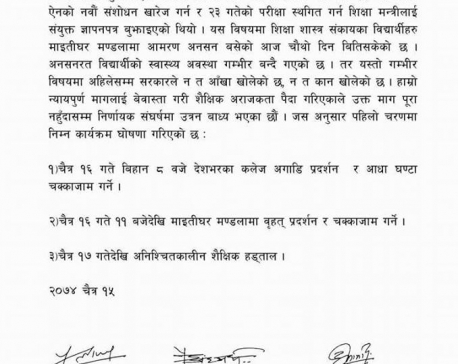
OR
Experts divided on constitutional complexities in forming new govt
Published On: July 16, 2016 02:20 AM NPT By: Republica | @RepublicaNepal
KATHMANDU, July 16: With some legal and constitutional experts arguing that a new government cannot be formed unless and until an election for a House of Representatives is held, Prime Minister KP Sharma Oli, who finds himself in a minority in Parlia\ment following the withdrawal of the CPN (Maoist Center) from the coalition government, discussed the constitutional issue with CPN-UML lawmakers at a parliamentary party meeting on Thursday.
However, most legal and constitutional experts suggest that PM Oli make way for the formation of a new government instead of falling for arguments about the complexities involved.
"We cannot buy any argument that in a parliamentary system a government reduced to a minority could continue in office for an indefinite period," said constitutional expert Bipin Adhikari.
"Since the transitional provisions of the Constitution do mention under what circumstances the position of the PM falls vacant, one cannot argue that a new government cannot be formed at all. The transitional provisions are indicative of the way forward and we should accept them in that spirit," he added.
Adhikari said that the PM, who has emerged as a nationalistic personality of dignity and stature, should not show greed for power at the last moment.
"PM Oli has emerged as a nationalistic and dignified leader in a time of crisis. He still has political agenda to pursue in Parliament and in the street. His place in politics will remain an influential one even after leaving government. He should appreciate that a government reduced to a minority cannot function in a parliamentary system," said Adhikari.
By contrast, another constitutional expert, Bhimarjun Acharya, opined that only a government that emerges from elections to the House of Representative can replace the Oli government.
"The new Constitution envisages the formation of a government under two Articles -- namely Articles 76 and 298. Article 76 cannot be invoked unless a House of Representative has been elected while Article 298 cannot be invoked again since it was envisaged for the formation of a government no later than seven days from the date of commencement of the new Constitution," said Acharya.
"With the Constitution already promulgated, we cannot go now into the origional intentions of its makers, and instead the Constitution should be allowed to speak for itself. So far as I am concerned, no new government could be formed until a House of Representative is duly elected," he added.
Advocate Sunil Kumar Pokharel, on the other hand, said the argument about constitutional complexities militating against the formation of a new government is a ridiculous one.
"Article 74 clearly states that the form of government shall be multi-party, competitive, federal, democratic, republican, parliamentary in form and based on pluralism, and we should respect the spirit of the parliamentary system," said Pokharel.
"How could we argue that Parliament can pass a no-confidence motion against a PM but cannot elect a new one?" questioned Pokharel.
He argued that there was confusion and misinterpretation rather than complexities.
"As Article 296 clearly states that the existing Parliament can perform tasks required to be performed by the Federal Parliament in accordance with this Constitution until such time as the election to the House of Representatives is held, Parliament can elect a new government in line with Article 76, which provisions formation of the council of ministers from the House of Representatives," Pokharel said.
"There are no complexities and I cannot understand why this non-issue is becoming an issue," he added.
Advocate Tika Ram Bhattarai argued that it would be wrong to say no new government could be formed as Parliament can pass a no-confidence motion against the prime minister, though constitutional complexities are there.
"There are complexities involved in forming a new government as the Constitution and parliamentary regulations do not have clear-cut provisions.
The procedural complications should be resolved through consensus between the political parties. However, as we are following a parliamentary system, it would be wrong to argue that no new government could be formed in a situation when the government has been reduced to a minority " said Bhattarai.
Speaking at a meeting of the UML's Parliamentary Party on Thursday, PM Oli had claimed that, as per the provisions in the new Constitution, no new government can be formed during this transitional period . He claimed that these provisions allow the PM to seek a confidence vote and others to file a no-confidence motion against him or her, but the Constitution does not say anything regarding the formation of a new government before the election of a new House of Representatives.
You May Like This

In a govt led by the Left, student unions affiliated to the govt stage protests
KATHMANDU, Mar 20: Three student unions affiliated to three major political parties protested in front of Maitighar Mandala and called... Read More...

Way cleared for forming new govt
KATHMANDU, Feb 15: With the Election Commission (EC) submitting the final results of the House of Representatives elections to the president... Read More...

Experts at odds on need for upper house in govt formation
KATHMANDU, Dec 15: Although the constitution clearly stipulates that a new government needs to be formed within 30 days of the... Read More...







Just In
- Govt appoints 77 Liaison Officers for mountain climbing management for spring season
- EC decides to permit public vehicles to operate freely on day of by-election
- Fugitive arrested after 26 years
- Indian Potash Ltd secures contract to bring 30,000 tons of urea within 107 days
- CAN adds four players to squad for T20 series against West Indies 'A'
- ‘Precast' technology introduced in the construction of bridges along Muglin-Pokhara road
- Leopard attack injures young man in Kanchanpur
- SC rejects writ petition filed against Home Minister Lamichhane












Leave A Comment